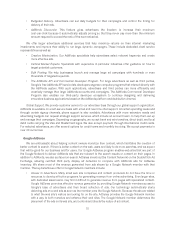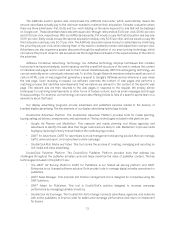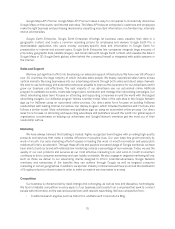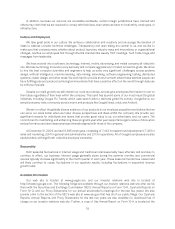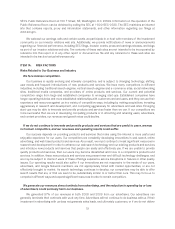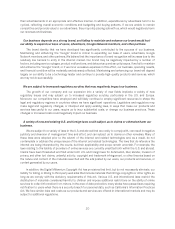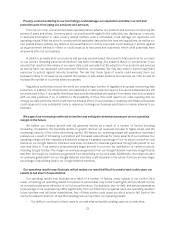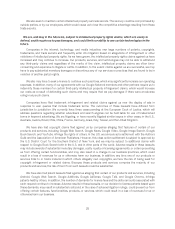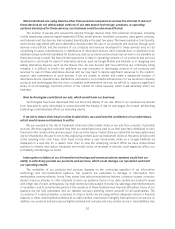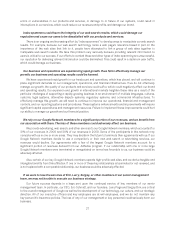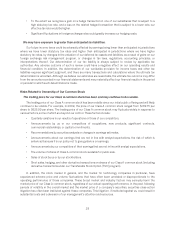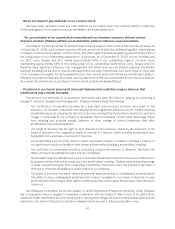Google 2009 Annual Report Download - page 38
Download and view the complete annual report
Please find page 38 of the 2009 Google annual report below. You can navigate through the pages in the report by either clicking on the pages listed below, or by using the keyword search tool below to find specific information within the annual report.their advertisements in an appropriate and effective manner. In addition, expenditures by advertisers tend to be
cyclical, reflecting overall economic conditions and budgeting and buying patterns. If we are unable to remain
competitive and provide value to our advertisers, they may stop placing ads with us, which would negatively harm
our revenues and business.
Our business depends on a strong brand, and failing to maintain and enhance our brand would hurt
our ability to expand our base of users, advertisers, Google Network members, and other partners.
The brand identity that we have developed has significantly contributed to the success of our business.
Maintaining and enhancing the “Google” brand is critical to expanding our base of users, advertisers, Google
Network members, and other partners. We believe that the importance of brand recognition will increase due to the
relatively low barriers to entry in the internet market. Our brand may be negatively impacted by a number of
factors, including service outages, product malfunctions, and data privacy and security issues. If we fail to maintain
and enhance the “Google” brand, or if we incur excessive expenses in this effort, our business, operating results,
and financial condition will be materially and adversely affected. Maintaining and enhancing our brand will depend
largely on our ability to be a technology leader and continue to provide high-quality products and services, which
we may not do successfully.
We are subject to increased regulatory scrutiny that may negatively impact our business.
The growth of our company and our expansion into a variety of new fields implicate a variety of new
regulatory issues and may subject us to increased regulatory scrutiny, particularly in the U.S. and Europe.
Moreover, our competitors have employed and will likely continue to employ significant resources to shape the
legal and regulatory regimes in countries where we have significant operations. Legislators and regulators may
make legal and regulatory changes, or interpret and apply existing laws, in ways that make our products and
services less useful to our users, require us to incur substantial costs, or change our business practices. These
changes or increased costs could negatively impact our business.
A variety of new and existing U.S. and foreign laws could subject us to claims or otherwise harm our
business.
We are subject to a variety of laws in the U.S. and abroad that are costly to comply with, can result in negative
publicity and diversion of management time and effort, and can subject us to claims or other remedies. Many of
these laws were adopted prior to the advent of the internet and related technologies and, as a result, do not
contemplate or address the unique issues of the internet and related technologies. The laws that do reference the
internet are being interpreted by the courts, but their applicability and scope remain uncertain. For example, the
laws relating to the liability of providers of online services are currently unsettled both within the U.S. and abroad.
Claims have been threatened and filed under both U.S. and foreign laws for defamation, libel, slander, invasion of
privacy and other tort claims, unlawful activity, copyright and trademark infringement, or other theories based on
the nature and content of the materials searched and the ads posted by our users, our products and services, or
content generated by our users.
In addition, the Digital Millennium Copyright Act has provisions that limit, but do not necessarily eliminate, our
liability for listing or linking to third-party web sites that include materials that infringe copyrights or other rights, so
long as we comply with the statutory requirements of this act. Various U.S. and international laws restrict the
distribution of materials considered harmful to children and impose additional restrictions on the ability of online
services to collect information from minors. In the area of data protection, many states have passed laws requiring
notification to users when there is a security breach for personal data, such as California’s Information Practices
Act. We face similar risks and costs as our products and services are offered in international markets and may be
subject to additional regulations.
20


